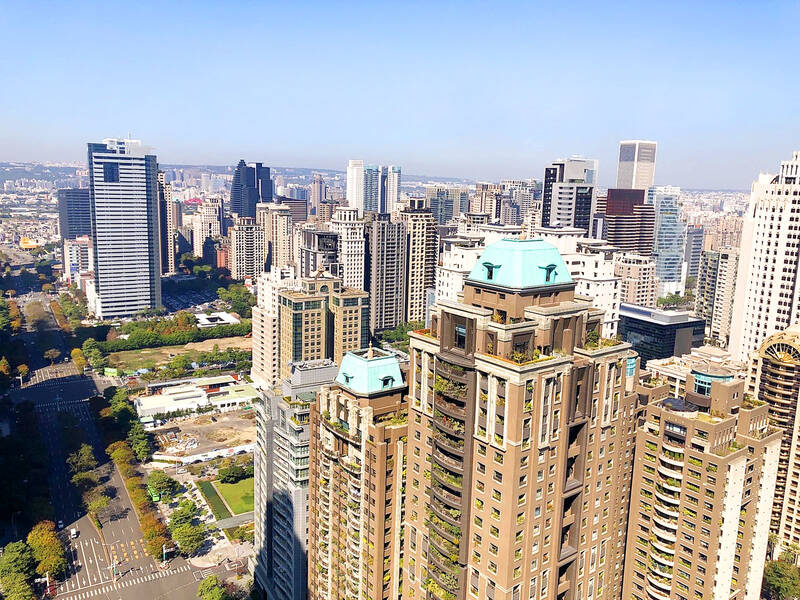New housing projects in the first 10 months of this year totaled more than NT$980 billion (US$31.44 billion) in northern Taiwan, with presale projects accounting for 85.5 percent, unfazed by legislative efforts to ban their resale, My Housing Monthly (住展雜誌) reported.
Increasing building material prices and labor shortages have prompted developers to slow construction on housing projects and delay their entry to the market, which would further widen the gap, the Chinese-language magazine said.
“Presale projects continue to dominate the new housing market one year after the introduction of bills to ban resale of presale contracts,” magazine research manager Chen Tsai-chi (成采錡) said.

Photo: Hsu Yi-ping, Taipei Times
The bills are intended to cool the property market, as housing prices have soared throughout Taiwan in the past two years on the back of an economic boom and firms shifting manufacturing facilities home from China amid US-China trade tensions, Chen said.
However, the legislature has not made any progress on the bills and might not pursue the efforts in the coming months as an economic slowdown and monetary tightening dampen buying interest, Chen said.
As of last month, presale projects in northern Taiwan totaled NT$844.5 billion, leaving newly completed houses a small share of 14.5 percent, or NT$143 billion, the magazine said.
The Hsinchu area has the lowest ratio of newly completed houses, at 3 percent, or NT$4.17 billion versus presale projects at NT$140 billion, as strong demand amid limited supply left buyers no choice but to target presale projects, it said.
Developers have aggressively launched presale projects in Hsinchu to meet fast-growing demand from cash-flush technology engineers, it added.
Newly completed houses account for 10.8 percent of the market in Taoyuan, which has a total volume of NT$285.1 billion, it said.
In Taipei, presale projects totaled NT$205.3 billion in the first 10 months, while newly completed houses rose 6.2 percentage points to NT$44.24 billion, or a 21.5 percent market share, due to the release of a luxury residential complex in Zhongzheng District (中正), it said.
Newly completed houses totaled NT$57.4 billion, or 17.9 percent of the NT$320 billion new housing market in New Taipei City, it said, adding that the ratio fell 3.4 percentage points from a year earlier.
Newly completed houses shed 11 percentage points to 16.8 percent in Yilan County, while dropping 9.1 percentage points to 18.1 percent in Keelung, it said.
The difference between presale projects and newly completed houses is expected to grow, as developers and builders postpone construction to cope with rising costs, a practice that would shrink the pool of newly completed houses, Chen said.

GROWING OWINGS: While Luxembourg and China swapped the top three spots, the US continued to be the largest exposure for Taiwan for the 41st consecutive quarter The US remained the largest debtor nation to Taiwan’s banking sector for the 41st consecutive quarter at the end of September, after local banks’ exposure to the US market rose more than 2 percent from three months earlier, the central bank said. Exposure to the US increased to US$198.896 billion, up US$4.026 billion, or 2.07 percent, from US$194.87 billion in the previous quarter, data released by the central bank showed on Friday. Of the increase, about US$1.4 billion came from banks’ investments in securitized products and interbank loans in the US, while another US$2.6 billion stemmed from trust assets, including mutual funds,

Micron Memory Taiwan Co (台灣美光), a subsidiary of US memorychip maker Micron Technology Inc, has been granted a NT$4.7 billion (US$149.5 million) subsidy under the Ministry of Economic Affairs A+ Corporate Innovation and R&D Enhancement program, the ministry said yesterday. The US memorychip maker’s program aims to back the development of high-performance and high-bandwidth memory chips with a total budget of NT$11.75 billion, the ministry said. Aside from the government funding, Micron is to inject the remaining investment of NT$7.06 billion as the company applied to participate the government’s Global Innovation Partnership Program to deepen technology cooperation, a ministry official told the

Taiwan Semiconductor Manufacturing Co (TSMC, 台積電), the world’s leading advanced chipmaker, officially began volume production of its 2-nanometer chips in the fourth quarter of this year, according to a recent update on the company’s Web site. The low-key announcement confirms that TSMC, the go-to chipmaker for artificial intelligence (AI) hardware providers Nvidia Corp and iPhone maker Apple Inc, met its original roadmap for the next-generation technology. Production is currently centered at Fab 22 in Kaohsiung, utilizing the company’s first-generation nanosheet transistor technology. The new architecture achieves “full-node strides in performance and power consumption,” TSMC said. The company described the 2nm process as

Even as the US is embarked on a bitter rivalry with China over the deployment of artificial intelligence (AI), Chinese technology is quietly making inroads into the US market. Despite considerable geopolitical tensions, Chinese open-source AI models are winning over a growing number of programmers and companies in the US. These are different from the closed generative AI models that have become household names — ChatGPT-maker OpenAI or Google’s Gemini — whose inner workings are fiercely protected. In contrast, “open” models offered by many Chinese rivals, from Alibaba (阿里巴巴) to DeepSeek (深度求索), allow programmers to customize parts of the software to suit their